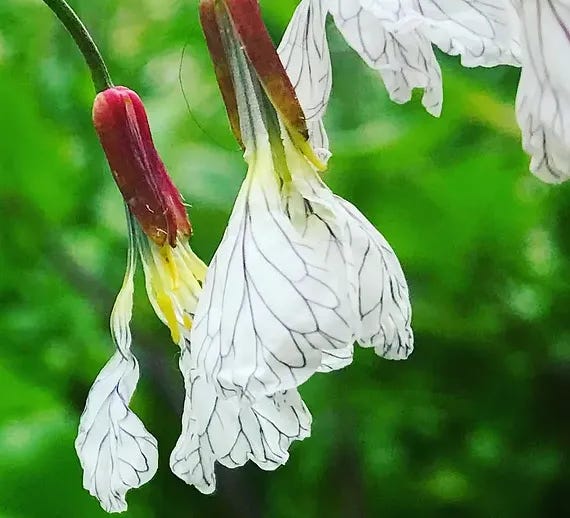
My mother and I in a photograph
A grief-love poem in 3 Tankas
My mother, and I,
fill a photo holding hands
weeks before she’s void.
Still see her hands, venous, dry,
lined with scripts I fail to read.Her body weighted
with childhood trauma; shrunk, bent,
ill. Her purpose lost,
scattered in ashes of one
who loved her so completely.Wilfully blind, I
sit holding her. Restive, not
heeding asteroids
headed for this merry earth—
frothy bubble that’s my world.
###
Tanka is a Japanese form of five lines with 5, 7, 5, 7, 7 syllables—31 in all
How this poem came to be
I wrote this poem in the year after my mother’s sudden death in May 2022. The grief and shock of that year produced a lot of poetry lines. I read somewhere that grief is just love. And also that anger and anxiety are both part of grief. I definitely felt anger—at myself. When I interrogated the anger I found it was because I blamed myself for not seeing her death coming, soon enough.
I had this photo with my mother, which was my last photo with her, taken only a month before she was gone. I would stare at the photo for extended periods of time after her death, trying to divine clues and meaning from it: Were there indications she was going to be gone soon? Why didn’t I see it coming? I observed in the photo how much and how suddenly she’d aged: “Still see her hands, venous, dry, / lined with scripts I fail to read.” Also with my father’s passing, a mere sixteen months before, how she’d probably lost her own will to go on. “...Her purpose lost,/ scattered in ashes of one / who loved her so completely.”
My parents had a loving marriage and my mother cared for my father diligently when he lay dying from Parkinson’s. This caregiving was not easy for her because she suffered from an autoimmune condition, which as I observe in the poem, was possibly a result of her own childhood trauma (India’s bloody Partition): “Her body weighted / with childhood trauma; shrunk, bent, / ill….” All these thoughts cemented in me a sense that I should have seen it coming. But clearly I had postponed the possibility in my head. That’s what “...wilfully blind” and the rest of the last Tanka refer to.
These torturous feelings went on for a while. And I thought of writing to expiate the anger, laying it out to face it for what it was. That’s where this poem came from. Eventually, I found comfort in the words, in forgiving myself for wanting to, needing to, believe my mother would always be around. Don’t we all? And finally in observing how lovingly we’re both seated in that photo, “...My mother, and I, / fill a photo holding hands…” which is the image I keep in my heart.
Once I wrote the poem, I worked on it for several months, removing extraneous words etc. Then I decided to honor the memory and my journey by shaping the poem in a form that I felt could carry it. I chose three Tankas to carry the three ideas within: a photo description of how we’re seated with love (what I’m keeping), noticing how frail and lost of purpose she is (the clues) and finally how avoiding the truth did not spare me the shattering from grief (the seed of the poem). Ultimately it’s a poem of processing grief and forgiveness for myself.
***
I have written a lot on grief and that is now a part of who I am. I know these reflections may not be for everyone and that’s OK. But I have observed that while we can wallow in grief to our peril, we can also pretend we have “moved on” to our equal peril.
I wrote my very first post on grief over four years ago after I lost my father. I share it here especially for those who may not have seen it before, in the hope that it resonates for you:
Whence poetry?
When I first became a poet discovered poetry within me, it took me a long time to believe it, even longer to publicly claim I’m a poet. I had to find that voice. It was the precursor to an opening happening inside me, which I believe now has me on a spiritual quest as well—that need for myth, for beauty, for an all abiding love in mystery and vice versa, a call that cannot be explained.
Recently, I read a beautiful book on the history of religion, and our need for the sacred, and it blew me away with this feeling of arriving upon a new world that the universe kept hidden from my view. Who knew? I certainly didn’t.
If all that doesn’t make sense, perhaps this might…
Poetry in its own way is ultimately mythology...
—Stanley KunitzStart at the 2:10 mark —>
Extra!
There’s always humor too!
Here’s something fun! HAIKUs at MIT (yes, that one) dedicated to SPAM (yes, that one). There’s even a book: Spam-Ku: Tranquil Reflections on Luncheon Loaf.
Talk about the expanse of creativity within constraints (aka “jugaad” as we Indians call it).
Until next time…








So much love. Thank you for sharing.
This poem is deeply touching and relatable. I, too, assumed my mom would be around forever, and the pain of losing her led me to write in Google Docs.